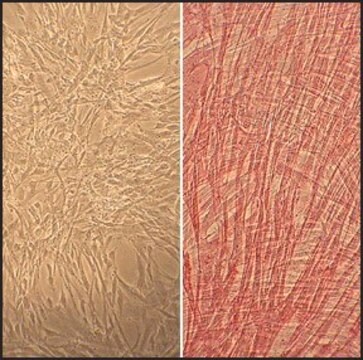354-05A
Human Aortic Smooth Muscle Cells: HAOSMC, adult
Synonym(s):
HAOSMC cells
About This Item
Recommended Products
biological source
human aorta (normal, tunica intima and tunica media, fibrous plaque-free)
Quality Level
packaging
pkg of 500,000 cells
manufacturer/tradename
Cell Applications, Inc
growth mode
Adherent
karyotype
2n = 46
morphology
smooth muscle
technique(s)
cell culture | mammalian: suitable
relevant disease(s)
cardiovascular diseases
shipped in
dry ice
storage temp.
−196°C
General description
Human Aortic Smooth Muscle Cells (HAOSMC) provide an excellent model system to study all aspects of cardiovascular function and disease, especially those related to mechanisms of hyperplasia and hypertrophy of intimal smooth muscle cells leading to vascular occlusion in atherosclerosis and stent restenosis.
HAOSMC have been utilized in dozens of research studies, for example, to:elucidate cytokines and growth factors signaling pathways implicated in the molecular regulation of smooth muscle cell proliferation, migration, and overall vascular function (Liu, 2009; Tan, 2009; Seymour, 2010; Chen, 2011; Hirase, 2013; Stein, 2013):
- Understand hyperglycemia-related risk factors for atherosclerosis in diabetes patients (Maier, 2010), as well as effects of ethanol on vascular calcification (Oros, 2012)
- Investigate extracellular elastic matrix deposition and its role in cardiovascular health, repair of damaged vasculature and successful tissue engineering (Gacchina, 2010, 2011; Venkataraman, 2012; Phillippi, 2013)
- Study mechanisms and effects of mechanoregulation on proliferation and function of smooth muscle cells (Jiang, 2009; Venkataraman, 2013, 2014), and develop advanced stent technology, including novel surface materials, and drug and gene delivery systems to prevent restenosis and other occlusive vasculopathies (Brito, 2010; Deshpande, 2013; Kakade, 2013; Lamichhane, 2013)
Characterization: Positive for smooth muscle cell specific alpha-actin expression.
Cell Line Origin
Application
Preparation Note
- Can be cultured at least 16 doublings
Subculture Routine
Disclaimer
Storage Class Code
11 - Combustible Solids
WGK
WGK 1
Flash Point(F)
Not applicable
Flash Point(C)
Not applicable
Certificates of Analysis (COA)
Search for Certificates of Analysis (COA) by entering the products Lot/Batch Number. Lot and Batch Numbers can be found on a product’s label following the words ‘Lot’ or ‘Batch’.
Already Own This Product?
Find documentation for the products that you have recently purchased in the Document Library.
Customers Also Viewed
Protocols
Technical information for working with human aortic smooth muscle cells including thawing, subculturing and cryopreservation.
Technical information for working with human aortic smooth muscle cells including thawing, subculturing and cryopreservation.
Technical information for working with human aortic smooth muscle cells including thawing, subculturing and cryopreservation.
Technical information for working with human aortic smooth muscle cells including thawing, subculturing and cryopreservation.
Our team of scientists has experience in all areas of research including Life Science, Material Science, Chemical Synthesis, Chromatography, Analytical and many others.
Contact Technical Service






